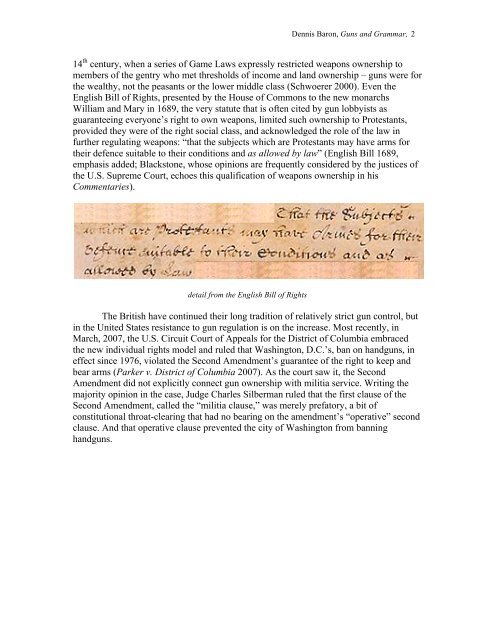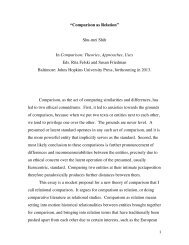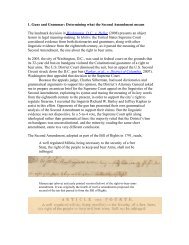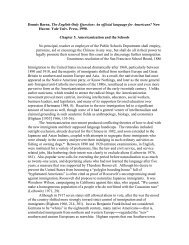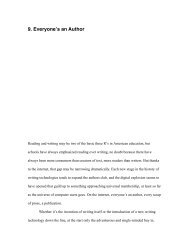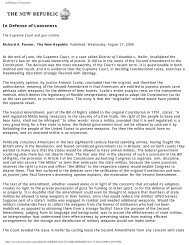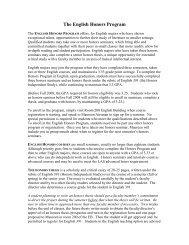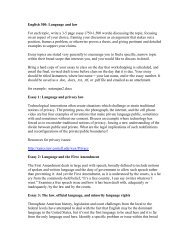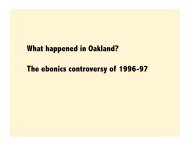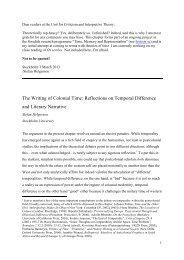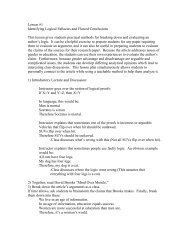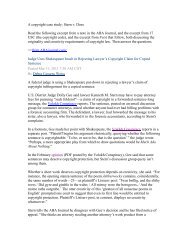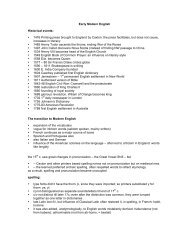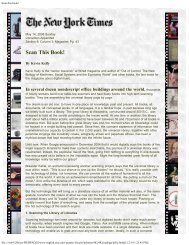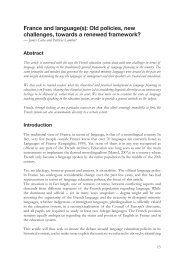Guns and Grammar: the Linguistics of the Second ... - English
Guns and Grammar: the Linguistics of the Second ... - English
Guns and Grammar: the Linguistics of the Second ... - English
You also want an ePaper? Increase the reach of your titles
YUMPU automatically turns print PDFs into web optimized ePapers that Google loves.
Dennis Baron, <strong>Guns</strong> <strong>and</strong> <strong>Grammar</strong>, 2<br />
14 th century, when a series <strong>of</strong> Game Laws expressly restricted weapons ownership to<br />
members <strong>of</strong> <strong>the</strong> gentry who met thresholds <strong>of</strong> income <strong>and</strong> l<strong>and</strong> ownership – guns were for<br />
<strong>the</strong> wealthy, not <strong>the</strong> peasants or <strong>the</strong> lower middle class (Schwoerer 2000). Even <strong>the</strong><br />
<strong>English</strong> Bill <strong>of</strong> Rights, presented by <strong>the</strong> House <strong>of</strong> Commons to <strong>the</strong> new monarchs<br />
William <strong>and</strong> Mary in 1689, <strong>the</strong> very statute that is <strong>of</strong>ten cited by gun lobbyists as<br />
guaranteeing everyone’s right to own weapons, limited such ownership to Protestants,<br />
provided <strong>the</strong>y were <strong>of</strong> <strong>the</strong> right social class, <strong>and</strong> acknowledged <strong>the</strong> role <strong>of</strong> <strong>the</strong> law in<br />
fur<strong>the</strong>r regulating weapons: “that <strong>the</strong> subjects which are Protestants may have arms for<br />
<strong>the</strong>ir defence suitable to <strong>the</strong>ir conditions <strong>and</strong> as allowed by law” (<strong>English</strong> Bill 1689,<br />
emphasis added; Blackstone, whose opinions are frequently considered by <strong>the</strong> justices <strong>of</strong><br />
<strong>the</strong> U.S. Supreme Court, echoes this qualification <strong>of</strong> weapons ownership in his<br />
Commentaries).<br />
detail from <strong>the</strong> <strong>English</strong> Bill <strong>of</strong> Rights<br />
The British have continued <strong>the</strong>ir long tradition <strong>of</strong> relatively strict gun control, but<br />
in <strong>the</strong> United States resistance to gun regulation is on <strong>the</strong> increase. Most recently, in<br />
March, 2007, <strong>the</strong> U.S. Circuit Court <strong>of</strong> Appeals for <strong>the</strong> District <strong>of</strong> Columbia embraced<br />
<strong>the</strong> new individual rights model <strong>and</strong> ruled that Washington, D.C.’s, ban on h<strong>and</strong>guns, in<br />
effect since 1976, violated <strong>the</strong> <strong>Second</strong> Amendment’s guarantee <strong>of</strong> <strong>the</strong> right to keep <strong>and</strong><br />
bear arms (Parker v. District <strong>of</strong> Columbia 2007). As <strong>the</strong> court saw it, <strong>the</strong> <strong>Second</strong><br />
Amendment did not explicitly connect gun ownership with militia service. Writing <strong>the</strong><br />
majority opinion in <strong>the</strong> case, Judge Charles Silberman ruled that <strong>the</strong> first clause <strong>of</strong> <strong>the</strong><br />
<strong>Second</strong> Amendment, called <strong>the</strong> “militia clause,” was merely prefatory, a bit <strong>of</strong><br />
constitutional throat-clearing that had no bearing on <strong>the</strong> amendment’s “operative” second<br />
clause. And that operative clause prevented <strong>the</strong> city <strong>of</strong> Washington from banning<br />
h<strong>and</strong>guns.


